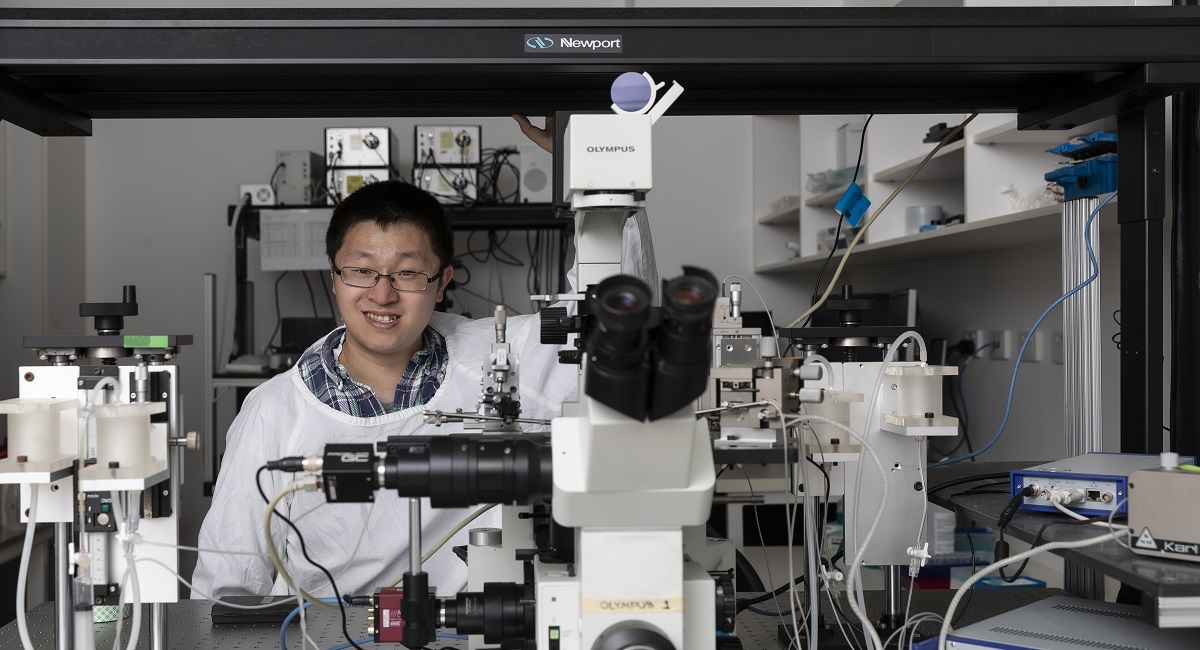Regional research set to get digital boost
- 5 mins read


Dr Lining Arnold Ju, University of Sydney. Image: supplied.
The Australian Academy of Science along with the Department of Industry, Science, Energy and Resources (DISER), today congratulates the 26 recipients of the Regional Collaborations Programme COVID-19 Digital Grants.
Just over $250,000 in funding has been awarded to early-career and mid-career researchers to increase connectivity and engagement between Australian and Asia–Pacific economies in response to the COVID-19 pandemic.

Dr Jin Han. Photo: supplied.
Dr Jin Han, an early-career researcher from the Black Dog Institute, will use her $8,940 grant to deliver an online mental health course, aimed at helping international university students develop effective stress coping strategies and psychological resilience post COVID-19.
“International students are more prone to social isolation with less access to public resources due to potential financial, informational, language or cultural barriers,” said Dr Han.
“This project will address an important gap in the current Asia–Pacific regional economics and public health.”

Professor Tanja Junkers. Photo: supplied
Professor Tanja Junkers, a mid-career chemist from Monash is also a grant recipient. Her $9,000 grant will go towards building a machine-readable cloud database of chemical reactions that can be combined by different laboratories around the world.
“This project is a completely new way of collaboration and interaction in the chemical space, be it across laboratories in one country, or across borders in the Asia–Pacific region,” said Professor Junkers.
This funding initiative, part of the Australian Government’s Global Innovation Strategy under the National Innovation and Science Agenda, supports projects that utilise digital methods of collaboration to address shared regional challenges related to the COVID-19 pandemic response and recovery.
The Regional Collaborations Programme (RCP) is managed by the Australian Academy of Science on behalf of the Department of Industry, Science, Energy and Resources.
The grant recipients are:
|
Recipient Name |
Project Title |
Grant Amount |
|
Dr Kiki Maulana Adhinugraha, La Trobe University |
How can digital innovation transform people’s behaviour in response to the COVID-19 restrictions in Indonesia? |
$9,980 |
|
Dr Thushari Atapattu, University of Adelaide |
MindSpace: Mental wellbeing and emotion awareness tool |
$10,000 |
|
Dr Venkatakrishnan Balasubramanian, Federation University Australia |
AI-based alarm to predict the sudden deterioration of health in COVID-19 patients |
$10,000 |
|
Dr Siva Chandrasekaran, Swinburne University of Technology |
Classification of nCov using deep learning CNN models on lung x-ray images |
$8,199 |
|
Dr Narelle Cox, Monash University |
Easing health-service burden during COVID-19: Supporting implementation of remote rehabilitation in chronic lung disease |
$9,998.65 |
|
Dr Amirhossein Eslami Andargoli, Swinburne University of Technology |
COVID-19 and virtual Healthcare: The barriers, enablers and drivers in Australia vs Pakistan |
$10,000 |
|
Dr Kelley Graydon, University of Melbourne |
Audiology digital training modules for low resourced settings |
$10,000 |
|
Dr Jin Han, Black Dog Institute |
Online mental health education for international students |
$8,940 |
|
Dr Hassan Hosseinzadeh, University of Wollongong |
Patient experience with telemedicine: A risk reduction approach to COVID-19 management in Bangladesh |
$9,990.90 |
|
Dr Guangming Jiang, University of Wollongong |
Development of a machine learning platform to estimate COVID-19 community prevalence through wastewater-based epidemiology |
$10,000 |
|
Dr Lining Arnold Ju, University of Sydney |
Hemodynamic analysis for COVID-19-on-a-chip model of blood clotting with integrated computational fluid dynamics simulation and particle image velocimetry. |
$10,000 |
|
Professor Tanja Junkers, Monash University |
Cloud-based chemical synthesis: Breaking barriers and redefining international collaboration in the chemistry space |
$9,000 |
|
Dr Kishan Kariippanon, University of Wollongong |
Surabaya mental well-being check in (Surabaya tangguh: platform kualitas hidup penyintas COVID-19) |
$9,970 |
|
Dr Arutha Kulasinghe, Queensland University of Technology |
Understanding the immunopathology of COVID-19 infected myocardial tissue |
$10,000 |
|
Dr Christopher Lowbridge, Menzies School of Health Research |
Strengthening health systems capacity to respond to public health threats through digital education |
$10,000 |
|
Dr Iderlina Mateo-Babiano, University of Melbourne |
The Gender and Transport Assemblage of Learning and Knowledge (GTALK) |
$9,976 |
|
Dr Sajib Mistry, Curtin University |
Geo-spatial transfer learning data analytics to detect COVID-19 misinformation in the social media. |
$10,000 |
|
Dr Davoud Mougouei, University of Wollongong |
Reducing COVID-19 vaccine hesitancy by integrating public sentiments in vaccine communication: a machine learning framework |
$9,998 |
|
Dr Soon Hock Ng, Swinburne University of Technology |
Web platform for remote data analysis and processing of synchrotron data |
$10,000 |
|
Dr Siddhi Pittayachawan, RMIT |
Cloud-based disaster relief coordination and optimisation platform: a proof of concept for Vietnam and beyond |
$10,000 |
|
Dr Derrick Roberts, University of Sydney |
‘Self-immolative’ commodity plastics for single-use medical PPE |
$9,245 |
|
Dr Shazia Ruybal, Walter and Eliza Hall Institute of Medical Research |
Fit-for-purpose analytical tools to support COVID-19 sero-surveillance in Papua New Guinea |
$10,000 |
|
Dr Chin Wee Tan, Walter and Eliza Hall Institute of Medical Research |
Computational bioinformatics of COVID-19 digital spatial profiling in lungs |
$10,000 |
|
Dr Kamala Thriemer, Menzies School of Health Research |
Interactive digital capacity building for clinical trial staff and research institutions |
$9,660 |
|
Dr Johanna Wapling, Menzies School of Health Research |
Streamlining systems for remote support of SARS-CoV-2 testing at the National Health Laboratory of Timor-Leste |
$8,870 |
|
Dr Laurence Wilson, CSIRO Health and Biosecurity |
Developing a COVID-19 genetics platform for data-driven decision making |
$10,000 |
Other activities being undertaken with the Department of Industry, Science, Energy and Resources in response to COVID-19 include a project examining the impact of the pandemic on women in STEM in the Asia-Pacific and a series of webinars discussing how science, technology and innovation are assisting in the response to the pandemic.
Background
The Regional Collaborations Programme COVID-19 Digital Grants aims to build strong regional linkages in the Asia–Pacific by funding multi-partner activities that facilitate greater collaboration in science, research and innovation and delivering innovative solutions to shared regional challenges.
These activities will reduce collaboration barriers and promote an open approach to science, research and industry collaboration through Australian-led projects and multilateral fora.
This investment in collaborative engagement will help establish enduring and impactful networks.
Read more about the Regional Collaboration Programme COVID-19 Digital Grants.





